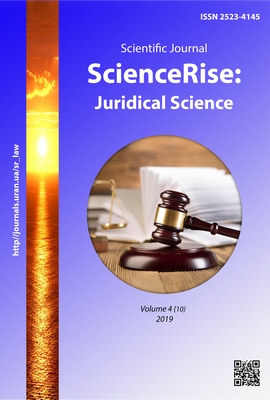The concept of the principle of rights at the doctrinal level
DOI:
https://doi.org/10.15587/2523-4153.2019.188607Keywords:
principle, law, rule of law, principle of the rule of law, doctrine, doctrinal awareness of the principle of the rule of lawAbstract
The author establishes the essence of the concept of the rule of law at the doctrinal level. The author concludes that it is expedient to study the rule of law as a legal category, as a legal doctrine in the context of an integral part of the genesis of the concept of the rule of law at the doctrinal level. There is a historical periodization of the formation of the idea of the rule of law in the context of the construction of a modern rule of law. It is suggested by understanding the principle of the rule of law for doctrinal equality through the method of realizing the principle of the rule of law in the system of theoretical knowledge. The concept of the category of the rule of law is defined on the basis of the provincial, traditional Ukrainian and foreign theoretical doctrine. The principle of the rule of law in the image of the law and the role of law in powers and suspensions; signification of legal rights and powers; legal rights and policies; legal rights and economics; relationship rights and morality; legal rights and traditions have been justified. Approaches to determine the substantive workload of the rule of law, which became the property of not only legal educational literature, but also monographs and dissertations, were stressed for the normal civil society. It is emphasized, that the principle of the rule of law is the basis, basis and guiding principles of a doctrinal understanding of the fullness of the concept of the rule of law in general. It is established that the issues, outlined today, are more than relevant, and therefore the prospects for their development are a dynamic phenomenon that requires attention, research and change, in accordance with the state and political and social mood of the society on an ongoing basis.
References
- Platon (2000). Derzhava. Kyiv: Osnovy, 968.
- Arystotel (2000). Polityka. Kyiv: Osnovy, 365.
- Mark Tulii Tsytseron (1998). Pro derzhavu, Pro zakony; Pro pryrodu bohiv. Kyiv: Osnovy, 1207.
- Howard, A. E. D. (1968). The road from Runnymede. Magna Carta and Constitutionalism in America. Charlottesville: The Univ. Press of Virginia, 126.
- Daisi, A. V.; Vinogradov, P. G. (Ed.) (1907). Osnovy gosudarstvennogo prava Anglii: perevod, dopolnennyi po 6-mu angliiskomu izdaniiu. Vvedenie v izuchenie angliiskoi konstitutsii. Moscow: Tip. t-va I.D. Sytina, 707.
- Schmitt, C. (1966). The Levithan in the State Theory of Thomas Hobbes. Cambridge: Cambridge. Univ. Press., 147.
- Selіvanov, V. (1997). Metodologіchnі problemi zaprovadzhennia konstitutsіinikh printsipіv «verkhovenstva prava» і «verkhovenstva zakonu». Pravo Ukraini, 6, 184.
- Rousseau, J. J. (1950). The Social Contract and Discourses. Book 1. New York: Dutton, 330.
- Montesquieu (1977). The Spirit of Laws: a compendium of the first English edition. 1747. Berkeley: University of California press, 563.
- Tymoshenko, V. I. (1994). Pravova derzhava (teoretyko-istorychne doslidzhennia). Kyiv: Nauk. dumka, 335.
- Pohorilko, V. (1996). Komentar do statti 8. Komentar do Konstytutsii Ukrainy. Kyiv: In-t zakonodavstva Verkhovnoi Rady Ukrainy, 145.
- Strelbytska, L. M. (2016). Teoriia derzhavy i prava. Kyiv: Kondor – Vydavnytstvo, 322.
- Rabinovych, P. (1997). Konstytutsiinyi pryntsyp verkhovenstva prava. Yurydycheskyi vestnyk, 3, 66.
- Holovatyi, S. P. (2010). Verkhovenstvo prava, abo zh Pravovladdia: vkotre pro doktrynalni manivtsi vitchyznianoi nauky S. P. Holovatyi. Pravo Ukrainy, 4, 206–219.
Downloads
Published
How to Cite
Issue
Section
License
Copyright (c) 2019 Artur Matevosian

This work is licensed under a Creative Commons Attribution 4.0 International License.
Our journal abides by the Creative Commons CC BY copyright rights and permissions for open access journals.
Authors, who are published in this journal, agree to the following conditions:
1. The authors reserve the right to authorship of the work and pass the first publication right of this work to the journal under the terms of a Creative Commons CC BY, which allows others to freely distribute the published research with the obligatory reference to the authors of the original work and the first publication of the work in this journal.
2. The authors have the right to conclude separate supplement agreements that relate to non-exclusive work distribution in the form in which it has been published by the journal (for example, to upload the work to the online storage of the journal or publish it as part of a monograph), provided that the reference to the first publication of the work in this journal is included.








